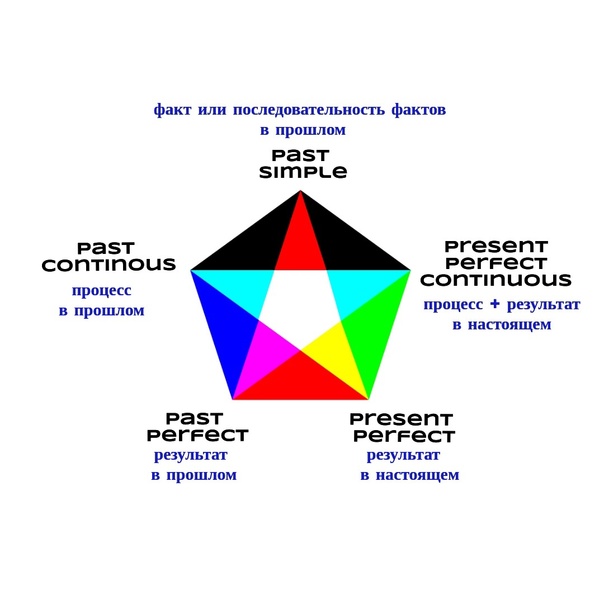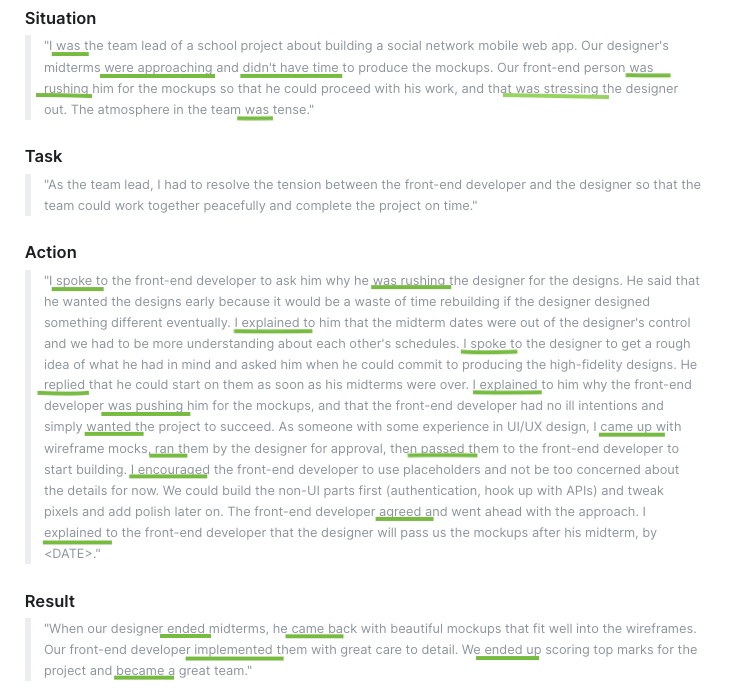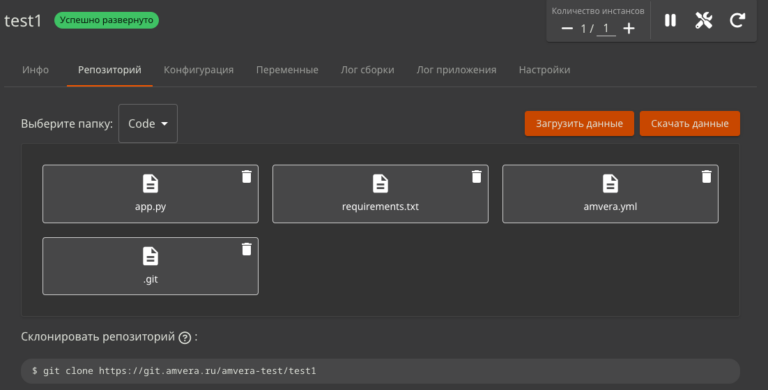what is it and how to prepare? (questions with answers for Software Developer + grammar)
The multi-stage interview process in IT sometimes takes up to 40 days, but as a rule, most candidates fall out after one of the first stages of selection – behavioral interview.
Usually behavioral questions include questions on the following topics:
Self-motivation
Ability to adapt
Communication skills
Conflict management
Creativity
Decision-making
Persuasion
Planning, time management, and priority-setting
Problem-solving skills
Ability to work in various teams
And most often they begin with the words:
Tell me about a time when you…
Describe a situation when you…
Give me an example of a time you
Think about an instance in which you…
Tell me how you approached a situation where…
Name a difficult challenge when you…
Imagine that…
What is something that… / What is the most…
If this was… , what would you…
The essence of the behavioral interview is that success in the past = success in the futureand it is also important for the recruiter to understand whether the candidate is “culture fit” for the company, that is, do you coincide in values, or more accurately, do you coincide? “behavior” (behavior) a candidate with the company’s values. These values (values, mission) of course it’s better to study first on the company website.
*Life hack – find someone who already works in this company in a similar position and just ask a couple of questions about these same values. Just burst into the chat and politely ask something like: “Hey Ben! This is Danila, I need some help. I’m applying for a job opening at your company. Could you kindly share what are the most important values at your workplace? I greatly appreciate your help. Thanks :)” This is normal in the tech people community, and you can also practice your English.
Two reasons why failure occurs at the behavioral interview stage:
Failed to demonstrate skills communication skills
Failed to demonstrate skill problem-sloving
Below we will look at the answers to 2 of these types of questions: communication skills (persuasion) + problem-solving, using the SCORE method and 1 using the STAR method, but let’s start with the question:
“Tell me about yourself”
You can be a brilliant techie, but if you simply don’t know how to convey ideas correctly (especially in English), this can signal to the recruiter that you are not a “team fit”, i.e. You just won’t fit into the team.
As a rule, a good answer to any question in a behavioral interview includes some kind of a story from the pastwhich in detail illustrates a specific experience. Naturally, from a linguistic point of view, the skill comes in handy here story-telling, that is, a sequential narrative of events. Hello, narrative tenses (“narrative”, “storytelling” tenses).

Narrative tenses – these are times from the past (Past Simple, Past Continous, Past Perfect). Will also be useful Present Simple for facts from the present time + Present Perfectin order to speak correctly about the achieved results and experience. We practice and work out all the stories in this time paradigm until they are imprinted into the cerebral cortex to the point of automatism.
Next we’ll look at response strategies on behavioral questions using the example of an authentic expert video in English from software engineer Sam. Let’s break it down by molecules key phrases And grammar on every issue. Next, we will decipher the SCORE and STAR frameworks and enter each of his answers into them so that the strategies become clearer.
The first question in any interview is:
“Tell me about yourself”
(Grammar Present Simple, Past Simple, Present Perfect)
Target phrases about experience:
I’m a… / I work as a…,
I worked on / with
I gained experience with
I was able to
I had ownership over / I was responsible for
I’ve developed
This includes… as well as…
I believe I (my experience) would be a great asset
There is a simple answer framework for this question:
Name is such and such, role is such and such, experience is such and such, what I love most about my job is this, that’s how I came to this, these are the results I achieved, my stack is such and such, and the vacancy says exactly this, You are such a great company, I want to consider this opportunity for myself, and with such baggage I am sure that I am suitable for this position.
“My name is… I’m a software developer. I love / enjoy / ‘ma fan of solving complex problems. I have 3 years of experience as a full-stack web app developer and I can work with all levels of the stack to build user-friendly efficient websites. My passion for web-app development started evolving during my internship at X-company. I worked on a solo project where I had ownership over / was responsible for everything including design decisions and actual coding of it. I was also able to gain experience with various cloud computing tools. After the internship, I decided that this is what I wanted to do as a career. Since then I’ve developed dozens of applications. At my current company I work on modernization of the existing infrastructure. This includes building out new microservices as well as updating existing ones. The technologies I have experience with include .NET for building out APIs on our server-side code, SQL with MySQL, Oracle, and SQL server, JavaScript frameworks including Vue.js and Angular. So, I believe my experience and my passion would make a great asset to your company.
The general time guideline for telling a story about yourself is 1.5-2 minutes, so set a timer and practice until it becomes automatic. This is a kind of “elevator pitch” about yourself.
The self-presentation will be followed by a series of behavioral questions.
So, the first behavioral question:
Tell me about a time when you had to persuade someone at work. What did you do? (PERSUASION)
Answer For such questions we form a “point” (SCORE) or “star” (STAR) framework
S-Situation (Situation/context)
C-Complication (Difficulties encountered)
O – Outcome Expectation (Worsening in the absence of action)
R – Remedial Action (Suggestions/actions)
E – End Result (Result / personal contribution / impact on the result)
Target phrases for SCORE framework elements:
S – There was no…
C – We ended up having…, The problem with it was…
O – We had to spend extra time…, This potentially increased…
R – My proposal was… , So what I did was… , I demonstrated pros and cons of…
E – So the result of it was… , We decided to…
“At my previous job my team supported 20-30 different web apps and there was no uniformity of what front-end javascript framework we should use. As a result we had some (ended up having) apps written in Angular, some written in React. So the problem with it wasfor example someone was assigned to write a feature in a certain app and they didn’t really know the framework, so we had to spend extra time to get a basic understanding of that framework before you can even start to implement that feature. So, this potentially increased by a lot. And, my proposal was all our apps be written in Vue.js because I had experience with it so it was easy to pick up, it was easy to inject it into existing applications. So what I did was I created a demo-presentation, I set up a meeting between my team and my manager and demonstrated the pros and cons of using that framework. So the result of it was that we decided to use Vue.js for all our new development. “ (All grammar is solid Past Simple, suitable for describing a sequence of actions)
Give me an example of a time when you failed at work. What did you learn from it? (PROBLEM-SOLVING)
S – I was assigned a task to … , As I was working on this feature …
C – You always want to keep…
O – If we did that (deployed this app), it would…
R – I was able to go back and… I had to create…
E – Later I learned that … , When I’m finally done with …
One time I was assigned a task to implement a feature into one of our applications and we use Git as our source control. As I was working on this feature I was continuously pushing to our master branch, which isn’t good practice because you always want to keep your master branch deployable and in sync with production. If we deployed this app with this feature being partially done, it would break the application. Of course we had an emergency bug fix that had to be made. Lucky with source control I was able to go back and make a change to the feature, but later I learned that if I wasn’t making any changes I had to create a branch off of master and deploy to that branch and only when I’m finally done with the feature, merge the changes back into master. (Grammar Past Simple, Past Continuous, Conditional 2)
You can also consider a similar framework STAR. In this framework, Complication and Outcome Expectation are combined into a Task item. If in the “star” STAR method you can simply describe what the task was, then in the method SCORE it is necessary to reveal this problem more deeply, what was the difficulty of the task and what potentially negative consequences could have occurred if no one took responsibility for solving this problem. An additional complexity of this framework is that you need to be able to handle the design competently conditional sentences 2nd type (Conditional 2), for example:
If we deployed this app without updating the feature, it would break the application.(This describes the “hypothetical” conditions and their consequences. If we did this (Past Simple), then there would be such consequences (would + Verb)
Next, consider the STAR response framework:


Below is a list of common behavioral questions for Software Engineer to prepare and practice storytelling skills, I will indicate in brackets which skills are tested by similar questions:
Tell me about a time when you had a conflict with a co-worker (communication skills, conflict resolution).
Tell me about a time in which you had a conflict and needed to influence somebody else (working under pressure, persuasion skills).
Give me an example of the most challenging aspect of your current project? (problem-solving skills)
Give me an example of the most difficult bug that you fixed in the past 6 months?(problem-solving skills)
Name a difficult challenge you faced while working on a project, how you overcame it, and what you learned. (learning skills, problem-solving skills)
Tell me about a time when something frustrated you at work (emotional intelligence)
Imagine it is your first day here at the company, what do you want to work on? (planning skills, adaptability)
Give an example of a project you have worked that is relevant to this company’s environment? (adaptability, analytical thinking)
Tell me about a time you had a disagreement with your manager (communication skills, leadership skills).
Tell me about a project you are most passionate about, or one where you did your best work (self-assessment skills).
What is something that did you have to push for in your previous projects? (persuasion skills)
What is the most constructive feedback you have received in your career? (ability to take criticism)
What is something did you have to persevere at for multiple months? (being goal-oriented)
Tell me about a time when you met a tight deadline (time-management skills).
If this were your first annual review with our company, what would I’ll be telling you right now? (self-assessment skills, being result-oriented)
Give an example of a time-management skill you’ve learned and applied at work (time-management skills, learning skills, adaptability).
Tell me about a problem you’ve had getting along with a work associate (teamwork skills).
Give me an example when are you handled criticism of your work? (ability to take criticism, communication skills)
What strengths do you think are the most important for your job position? (self-assessment skills)
What would you hope to achieve in the first six months after being hired? (adaptability, goal setting, priority setting)
To summarize everything said above, I would like to note that any behavior interview has its own structure and features. And it’s important and necessary to prepare for it, and I’ll tell you how to do it in another article!




